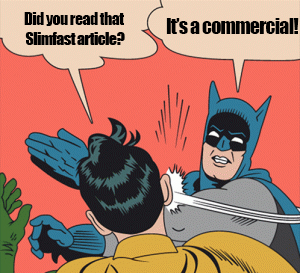 It’s finally happened; the National Advertising Division (NAD) of the BBB is holding a major publisher responsible for the way native advertising is presented in its publication.
It’s finally happened; the National Advertising Division (NAD) of the BBB is holding a major publisher responsible for the way native advertising is presented in its publication.
“American Media, Inc. has agreed to discontinue certain advertisements that ran in weekly celebrity magazine Star amid claims that they don’t live up to industry transparency standards,” writes Greg Dool in Folio.
“In response to a complaint filed by the Better Business Bureau’s National Advertising Division (NAD), AMI announced that it will no longer run SlimFast advertisements in Star using a format considered by NAD to be insufficiently differentiated from editorial content, misleading readers,” Dool continues.
While this might be bad news for AMI’s bottom line in the short term, it’s great news for the integrity of the magazine industry in general.
“While the advertising itself was for SlimFast, the magazine was promoting the product on behalf of SlimFast when it published what appeared to be editorial content, but was, in fact, advertising,” a NAD spokeswoman explained to Folio:
AMI, for their part, says they disagree with NAD’s position, but “saw no purpose in challenging NAD’s position because the ad campaign had been concluded,” according to a comment by their legal counsel on Dool’s article.
It had to happen sooner or later. Consumers have never been keen on sponsored content, and often report feeling deceived by it. And with the massive attention on “fake news” since the last election, tolerance is dropping. Fake news appears to be putting a serious dent into native advertising.
For the short term, yes, publishers that rely on native ads are likely to feel the pain. But the risk to their brand’s credibility isn’t worth the financial gain from this practice.
